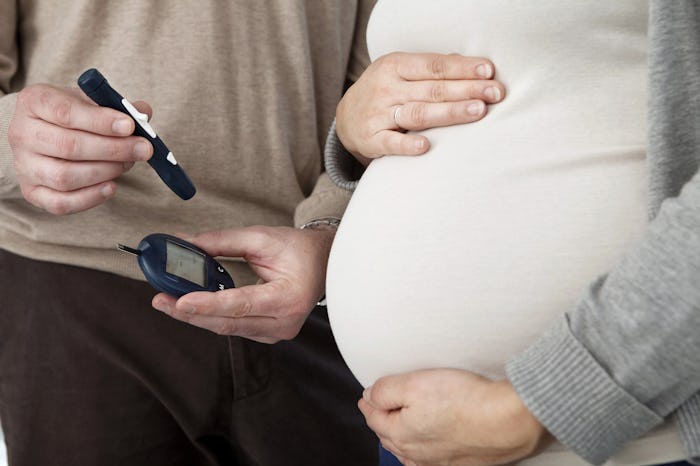Life

What Is Gestational Diabetes?
Of the many conditions that can occur during pregnancy, one that you may have heard mentioned more often than others is gestational diabetes. But exactly what is gestational diabetes, and how will you know if you have it? As you may have guessed by the name, it is a form the autoimmune disease, diabetes. However, this type is exclusive to pregnant women. According to the website for the American Diabetes Association, "pregnant women who have never had diabetes before but who have high blood glucose (sugar) levels during pregnancy are said to have gestational diabetes." So even if you don't have diabetes before getting pregnant, is possible to develop this condition during pregnancy.
Although it's not completely clear to medical experts why gestational diabetes happens, they do have a few clues. The biggest one being with the way your body processes insulin. As Mayo Clinic reported, "insulin is a hormone that helps glucose move from your bloodstream into your body's cells, where it's used as energy." Since hormonal changes run wild throughout pregnancy, insulin production and levels can be effected. These pregnancy hormone changes can lead to your body developing insulin resistance, resulting in gestational diabetes, according to the website for the National Institute of Diabetes and Digestive and Kidney Diseases.
If you're wondering about your odds of getting gestational diabetes, the chances are seven out of 100, as the March Of Dimes website reported. It's often identified about mid-way through pregnancy (typically 24 to 28 weeks) when your doctor tests for this condition. If your doctor's office is like mine, you'll have to drink a sugary concoction on an empty stomach to see how your insulin reacts — so be prepared for that experience.
But suffering through the overly sweet liquid and a blood draw is worth it. Knowing the results of this test can help to keep you and your baby safe throughout the remainder of your pregnancy. As the website for the Centers for Disease Control and Prevention pointed out, not knowing about or controlling the blood sugar in women with gestational diabetes can lead to problems for both mama and baby. If not properly managed, this condition can lead to the possibility of delivering an extra large baby, upping your chance of a C-section delivery, developing preeclampsia, and increasing the risk of having low blood sugar.
Since gestational diabetes is fairly common, doctors and midwives are prepared to help guide you through this condition every step of the way, should you test positive. Although this is a serious condition, there is one upside: it's only temporary. As the name suggests, once gestation ends, so does the diabetes. According to Baby Center, after the birth, blood sugar returns to normal in the majority of cases.
This article was originally published on